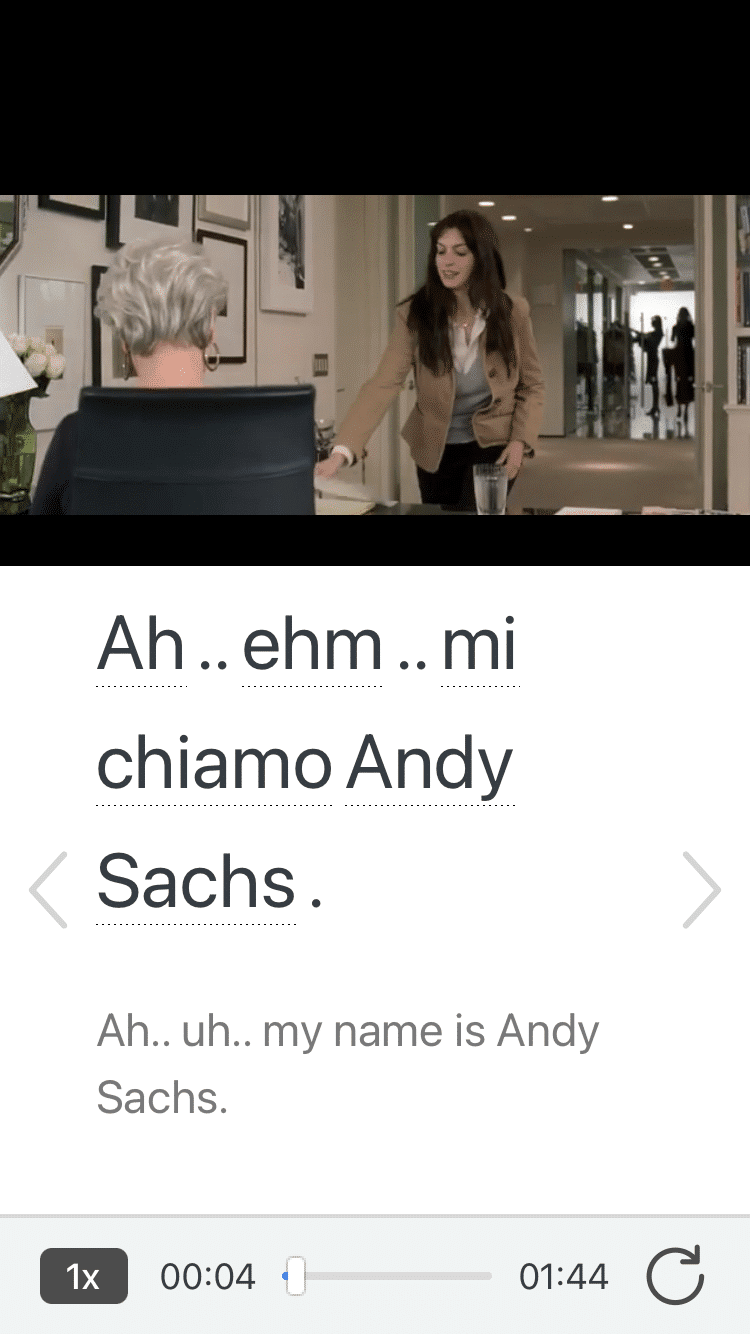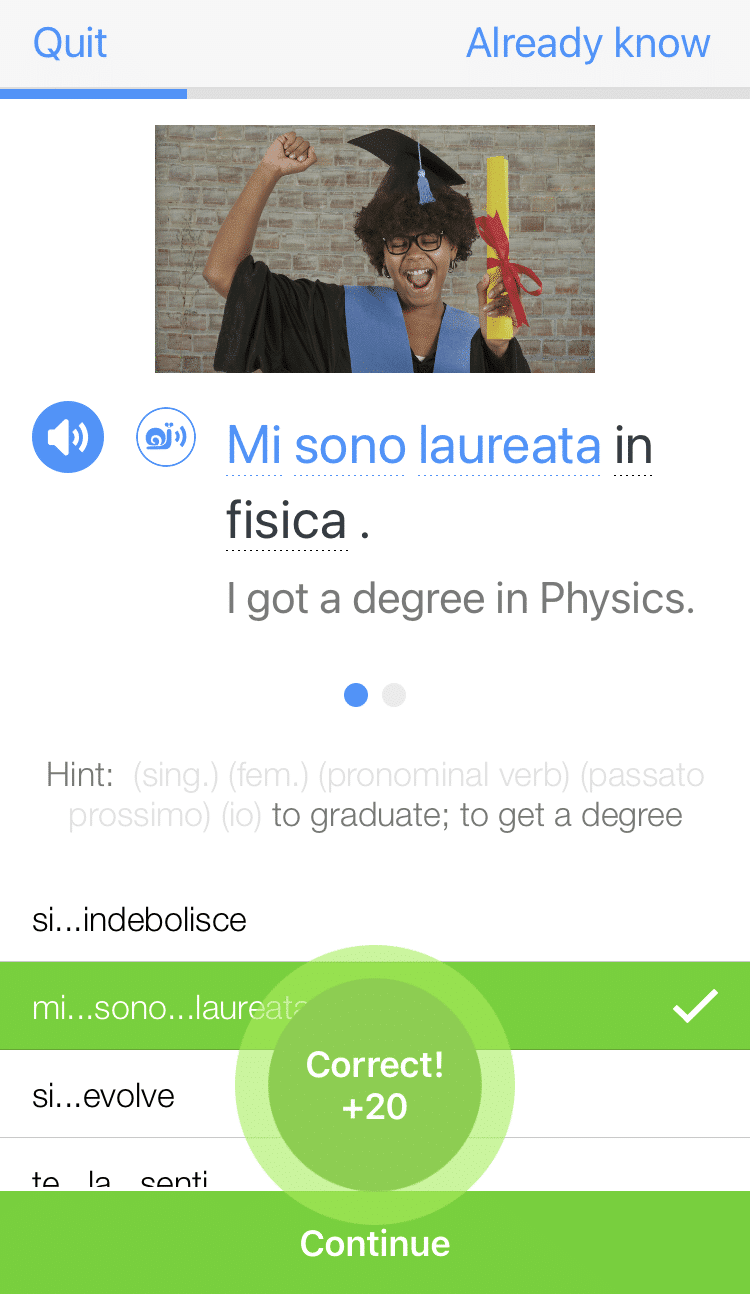
The Italian Past Subjunctive
The subjunctive is a “grammatical mood” for talking about things doubted or felt, and within that category there are various types.
If you’re reading this, you’ll hopefully have already mastered the Italian present subjunctive.
In this article, we’ll be looking in-depth at three Italian past subjunctive moods: the perfect subjunctive, the imperfect subjunctive and the pluperfect subjunctive.
Contents
- Formation of the Italian Past Subjunctive
- Uses of the Italian Past Subjunctive
- Practicing the Italian Past Subjunctive on Your Own
- And One More Thing...
Download: This blog post is available as a convenient and portable PDF that you can take anywhere. Click here to get a copy. (Download)
Formation of the Italian Past Subjunctive
The perfect, imperfect and pluperfect subjunctive look similar in some ways to their indicative-mood counterparts, so keep those in mind as you progress.
Formation of the Perfect Subjunctive
The perfect subjunctive is like the passato prossimo except that the helper verbs (essere and avere) are used in their present subjunctive forms:
| Pronoun | Avere | Essere |
|---|---|---|
| io | abbia | sia |
| tu | abbia | sia |
| lui / lei / Lei | abbia | sia |
| noi | abbiamo | siamo |
| voi | abbiate | siate |
| loro | abbiano | siano |
Just as with the indicative passato prossimo, the choice of avere or essere depends on the main verb; you’ll make the same choice in the perfect subjunctive.
Once we have our helper verb, we add the standard past participle of the main verb.
This gives us perfect subjunctive formations like:
che io abbia scoperto — that I discovered
che tu abbia parlato — that you (informal) spoke
che voi abbiate avuto — that you (plural) had
che noi siamo andate — that we (a group of women) went
As you can see above, past participles (like scoperto and avuto) that are irregular in the indicative passato prossimo are likewise so in the subjunctive. And the participles also modify according to the same rules as well (as we see with andate).
Formation of the Imperfect Subjunctive
The imperfect subjunctive is the trickiest of the three in terms of conjugations. It corresponds in the indicative to the past imperfect.
For regular imperfect subjunctive verbs, you can remove endings of the infinitives and add the following endings:
| Pronoun | Andare (to to go) | Vedere (to see) | Dormire (to sleep) |
|---|---|---|---|
| che io | andassi | vedessi | dormissi |
| che tu | andassi | vedessi | dormissi |
| che lui / lei / Lei | andasse | vedesse | dormisse |
| che noi | andassimo | vedessimo | dormissimo |
| che voi | andaste | vedeste | dormiste |
| che loro | andassero | vedessero | dormissero |
As a shortcut for memorization purposes, note that:
- The imperfect subjunctive endings above are identical across all verb types except for the initial a, e or i of the ending.
- The io and tu forms are identical for each verb. It can thus be necessary to use the subject pronouns for clarity more than you would normally.
There are also, unfortunately, irregular imperfect subjunctive verbs. With the exception of essere (to be), they take the –ere imperfect subjunctive endings above. And most often, the stem is the same as the stem of the past imperfect io form.
So for fare (to do, to make) we have io facevo in the past imperfect, and then adding the –ere imperfect subjunctive endings we get:
| Pronoun | Fare (to do, to make) |
|---|---|
| che io | facessi |
| che tu | facessi |
| che lui / lei / Lei | facesse |
| che noi | facessimo |
| che voi | faceste |
| che loro | facessero |
The verbs dare (to give) and stare (to be) follow the same formula, as do verbs with contracted infinitives. (Note that the conjugations of stare can also serve as the base for yet another mood, the imperfect continuous subjunctive: che io stessi parlando — that I was speaking, etc. That forms the subjunctive that corresponds to the imperfect continuous indicative.)
The true weirdo irregular verb here for the imperfect subjunctive is essere (to be):
| Pronoun | Essere (to be) |
|---|---|
| che io | fossi |
| che tu | fossi |
| che lui / lei / Lei | fosse |
| che noi | fossimo |
| che voi | foste |
| che loro | fossero |
Formation of the Pluperfect Subjunctive
To form the pluperfect subjunctive, you’ll follow the pattern of the passato prossimo but use the imperfect subjunctive of avere or essere as your helper verbs.
It’s easier than it might sound:
| Avere | Essere | |
|---|---|---|
| io | avessi | fossi |
| tu | avessi | fossi |
| lui / lei / Lei | avesse | fosse |
| noi | avessimo | fossimo |
| voi | aveste | foste |
| loro | avessero | fossero |
The choices of avere vs. essere are as usual, and the past participles are the same as with the passato prossimo (whether regular or irregular).
To use the same example verbs as we saw with the perfect subjunctive, we thus get:
che io avessi scoperto — that I had discovered
che tu avessi parlato — that you (informal) had spoken
che voi aveste avuto — that you (plural) had had
che noi fossimo andate — that we (a group of women) had gone
Uses of the Italian Past Subjunctive
The conditions for triggering the past subjunctive are quite similar to those for the present subjunctive: talking about doubts, feelings and unreality.
The past subjunctive moods, however, tend to often carry some sort of past—or at least “previous”—meaning:
| Uses of the Past Subjunctive | Subjunctive Tense | Example Sentence |
|---|---|---|
| Past doubts and feelings about the past | Perfect | È stato un peccato che non abbiano vinto il concorso. (It was a shame they didn't win the competition.) |
| Present doubts and feelings about the past | Perfect | Spero che il mio amico abbia ricevuto il mio messaggio. (I hope that my friend received my message.) |
| Future doubts and feelings | Perfect | Gli regaleremo qualcosa che non abbiano già ricevuto. (We will give them something that they haven't already received.) |
| Feelings and doubts about the hazy, undefined past | Imperfect | Era strano che non ci fossero altre persone nella sala d'attesa. (It was strange that there weren't other people in the waiting room.) |
| Feelings and doubts about past events at different times | Plurperfect | Era sorpreso che tu non avessi ancora mangiato. (He was surprised that you hadn't eaten yet.) |
| Unique or hypothetical situations | Imperfect | Se solo fossi un po' più alto, potrei raggiungere quel ripiano. (If only I were a bit taller, I could reach that shelf) |
| Pluperfect | Avrei telefonato se avessi avuto il tuo numero. (I would have called if I had had your number.) |
As we go through some uses of the subjunctive moods below, you’ll get an idea of contexts in which they might be used, but it’s up to you to keep practicing to make the usage really stick.
At the end of this post, we’ll touch on some additional ways to practice.
Feelings and Doubts
Past Doubts and Feelings About the Past
To start, let’s see how the perfect subjunctive (the subjunctive counterpart to the passato prossimo) can be used when indicating past doubts and feelings about past events. In these cases, the feeling or doubt tends to have occurred at the same (past) time as the event in question.
È stata una delusione che il sottomarino sia esploso. — It was a let-down that (when) the submarine exploded.
Mi è dispiaciuto che abbiano rinviato la convocazione per mercoledì. — I was sorry that (when) they delayed the summons to Wednesday.
Present Doubts and Feelings About the Past
Now let’s look at some uses for the perfect subjunctive to indicate current doubts and feelings about past events.
È deprimente che lo scrittore abbia guadagnato così poco per un articolo. — It is depressing that the writer earned so little for an article.
Temo che loro abbiano già deciso. — I fear that they have already decided.
Credo che l’inverno passato lui sia venuto a Firenze. — I believe that last winter he came to Florence.
Non credo che lui abbia tenuto un comportamento professionale alla riunione. — I don’t believe that he behaved professionally at the meeting.
Penso che lei non mi abbia mai amato. — I think that she never loved me.
Credo che lei mi abbia tradito. — I believe that she cheated on me.
But in contrast also note that when talking about present feelings about past events, phrases are often instead formulated with perché (because) and in other ways that don’t lead to a dependent past subjunctive clause. Then, the indicative past tenses are used instead, as in the following examples.
Sono arrabbiato perché l’inverno passato lui non è venuto a Firenze. — I’m angry that last winter he didn’t come to Florence.
Va meglio ora che ci siamo imbacuccati. Fa freddo! — It’s better now that we got bundled up. It’s cold!
The perfect subjunctive can be used with some conditional phrases in the main clause as well, in order to express doubts about past events.
Potrebbe essere che abbiano bucato. — It could be that they got a flat tire.
Future Doubts and Feelings
But it’s not all just about the past! The perfect subjunctive can be used to talk about future doubts and feelings concerning an event or situation that will have happened previously, or may not exist.
Cercherò una stanza che non sia già stata affittata. — I will look for a room that hasn’t already been rented out. (We’re talking about a room whose existence may be imaginary.)
Sceglieremo una sceneggiatura che lei non abbia già letto. — We will select a film script that she has not already read.
Feelings and Doubts About the Hazy, Undefined Past
Moving on, the imperfect subjunctive corresponds pretty neatly to the indicative past imperfect and is thus used to talk about our feelings and doubts about pasts with hazier, incomplete, undefined ends.
Ho avuto l’impressione che facessero la spesa. — I had the impression that they were doing the shopping (in the supermarket).
Non vedevo l’ora che arrivasse il mio nuovo zaino con le ruote! — I couldn’t wait until my new backpack with wheels would arrive.
Era divertente che ci fossero tanti altri ballerini nel nostro albergo. — It was fun that there were so many other dancers in our hotel.
Quando ho sentito il tuono, pensavo che iniziasse a piovere. — I believed that it was starting to rain when I heard the thunder.
Era sconfortante il fatto che non sentissero bene il cantante. — It was depressing that they couldn’t hear the singer well.
Note in the above examples that the main (feelings-or-doubts) clause was generally happening at around the same time or before the action in the imperfect subjunctive clause.
Feelings and Doubts About Past Events Occurring at Different Times
But if we’re talking about past feelings and doubts about something that had happened even before that, we’ll instead want to employ the pluperfect subjunctive. Contrast for example the following sentences; the first uses the imperfect subjunctive and the second uses the pluperfect subjunctive.
Lui disapprovava che io fumassi. — He disapproved of me smoking. (He was giving me the stink eye while I was smoking. / My smoking was an ongoing thing at that time that he disapproved of.)
Lui disapprovava che io avessi fumato. — He disapproved of the fact that I had smoked. (He returned to the house to find that I had been smoking before he got in, for example.)
Finally, and rather incidentally, to emphasize the ongoing nature of a past smoking problem, many Italian speakers may also be inclined to just employ the imperfect indicative, which of course emphasizes ongoing, uncompleted actions.
Lui disapprovava che io fumavo. — He disapproved of the fact that I used to be a smoker.
This contrast can be used to help distinguish the order of past events.
Sembrava che il negozio non spedisse lo zaino fino a quando lui non avesse fatto il bonifico — It seemed that the store wouldn’t send the backpack until he had made the bank transfer.
If that gives you a headache, here’s a simpler pluperfect subjunctive example of past-before-past-doubts to clear the air:
Non sapevo che fossero tornati dalla Serbia. — I didn’t know that they had returned from Serbia.
Unreal or Hypothetical Situations
The imperfect and pluperfect subjunctive can also be used in ways that don’t actually suggest the past, but rather a hypothetical situation. Fortunately, we sometimes have quite parallel constructions in English, so this shouldn’t seem so strange. To learn these, it helps to recognize some of the trigger words that are used to set up hypothetical situations, such as magari (if only), caso mai (in case), anche se (even if), and come se (as if).
I’ve employed some rather awkward, overly literal English translations below, I know, but I hope they help give a sense of what each part of the Italian phrase is doing.
Magari fosse così semplice. — If only it were so simple. (This could well refer to the present—but a hypothetical one.)
Magari io potessi venire in Brasile! — If only I could come to Brazil!
Caso mai lui non fosse ancora arrivato, lascia i pacchi alla sorella. — In case he has not yet arrived, leave the packages with his sister.
Caso mai io non trovassi una stanza, andremo in albergo. — In case I can’t find a room, we’ll go to the hotel.
Anche se lei si fosse svegliata, non aiuterebbe. — Even if she woke up, she wouldn’t help.
Comportati come se non sapessi niente! — Behave as if you know nothing!
Also for hypothetical effect, the imperfect and pluperfect subjunctives can be coupled with a clause in the present conditional, in order to present an “if-then” fictional situation.
Parleremmo di tutto se fossero a loro agio con la sessualità. — We would talk about everything if they were comfortable with sexuality.
An imperfect or pluperfect subjunctive clause can also be coupled with a past conditional clause to talk about unreal past hypotheticals and their unreal results.
Mi sarebbe piaciuto che avessi colto le prugne dall’albero. — I would have liked it if you had picked the plums from the tree.
Practicing the Italian Past Subjunctive on Your Own
Ready to give this all a go? Here are some practice ideas:
- You can check any past subjunctive conjugations that aren’t in this article using WordReference’s Italian conjugator.
- I love and recommend “Soluzioni: A Practical Grammar of Contemporary Italian” for coming to grips with the use of the past subjunctive.
- Good old-fashioned flashcards are brilliant for memorizing, but nothing beats just trying them out with language exchange partners, whether you find them in your neck of the woods or online.
- You can also practice by hearing native Italian speakers use them. For example, you could try using an immersion program like FluentU to hear the past subjunctive used in context.
FluentU takes authentic videos—like music videos, movie trailers, news and inspiring talks—and turns them into personalized language learning lessons.
You can try FluentU for free for 2 weeks. Check out the website or download the iOS app or Android app.
P.S. Click here to take advantage of our current sale! (Expires at the end of this month.)
- Verbling is a great resource for finding an online Italian teacher who fits your specifications and who can give you lessons right on the site for practicing Italian tenses.
In any case, don’t try to tackle all of these at once. Pick one subjunctive mood at a time, and focus on the uses and trigger words that lead to that. What can you discuss about your own feelings about past events? What doubts do you have about the past? What hypothetical situations can you dream up? What “if-then” scenarios are relevant to your life at the moment?
After a while the conjugations will start to flow, and you’ll be able to avoid taking that dreaded long pause as you lurch towards the past subjunctive clause. Instead, you’ll just be focused on the hopefully lovely feelings about your past adventures.
Download: This blog post is available as a convenient and portable PDF that you can take anywhere. Click here to get a copy. (Download)
And One More Thing...
If you're as busy as most of us, you don't always have time for lengthy language lessons. The solution? FluentU!
Learn Italian with funny commericals, documentary excerpts and web series, as you can see here:

FluentU helps you get comfortable with everyday Italian by combining all the benefits of complete immersion and native-level conversations with interactive subtitles. Tap on any word to instantly see an image, in-context definition, example sentences and other videos in which the word is used.

Access a complete interactive transcript of every video under the Dialogue tab, and review words and phrases with convenient audio clips under Vocab.

Once you've watched a video, you can use FluentU's quizzes to actively practice all the vocabulary in that video. Swipe left or right to see more examples of the word you’re on.

FluentU will even keep track of all the Italian words you’re learning, and give you extra practice with difficult words. Plus, it'll tell you exactly when it's time for review. Now that's a 100% personalized experience!
The best part? You can try FluentU for free with a trial.
Start using the FluentU website on your computer or tablet or, better yet, download the FluentU app from the iTunes or Google Play store. Click here to take advantage of our current sale! (Expires at the end of this month.)



